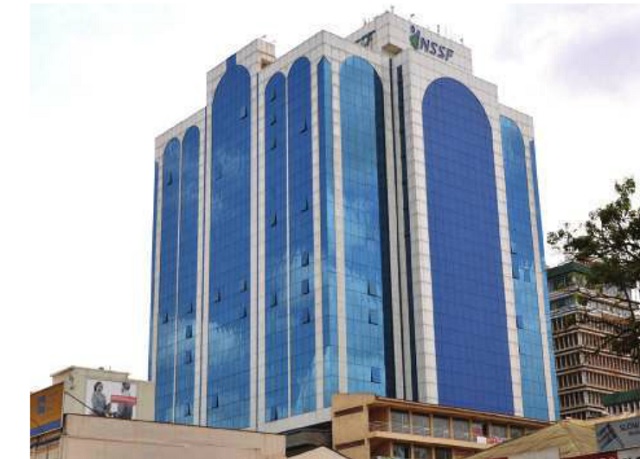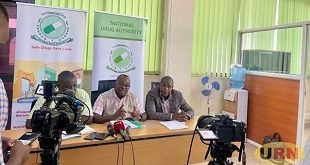
Kampala, Uganda | THE INDEPENDENT | When will the controversies over the National Social Security Fund-NSSF end? Who will be the next NSSF Managing Director? What is difficult in appointing the MD anyway? Is the 17.8 trillion-Shilling worth of assets safe? Will the probe by parliament, the NSSF Board and perhaps the Inspectorate of Government resolve the controversies?
These are some of the many questions that are being asked by savers with NSSF and the general public as the uncertainty over its future continues. But the other major question is why are there so many forces on the battleground. Is it the temptation to have easy access to the assets of the Fund or the urge to give maximum protection from abuse of the richest financial institution in Eastern Africa?
By asset size, the NSSF is the biggest pension fund at almost 18 trillion Uganda Shillings, while Kenya’s NSSF has an asset size of about 5 Trillion Shillings (171 Billion Kenya Shillings). The different forces include the two supervising ministries that were provided for in the NSSF (Amendment) Act, as part of streamlining the management of the two main functions of the Fund, provision of social security and investing the saver’s money to give the beneficiaries interest.
Other interested parties are the Board, which has also developed signs of disagreements, the former and the current management teams, workers’ parliamentary representatives, the employers, the savers, the regulator, and some external forces. The Ministry of Finance, Planning, and Economic Development supervise the investment department of the Fund, while the Ministry of Gender, Labour, and Social Development oversees social security.
However, the law leaves a thin line between the roles of the two where the Gender Ministry oversees the budgeting function, including budgeting for the implementation of the investment programs. The Minister of Gender Betty Amongi has clearly indicated her position against the reappointment of Byarugaba, claiming mismanagement of the fund among other reasons, which the former MD has refuted.
She also accuses him of blocking the potential application of the Fund for the country’s development agenda as set out in the National Development Plan. Instead, Byarugaba, who seemingly enjoys a warm relationship with the Finance Ministry blames his bad record with Amongi on his stand against what he calls ‘irregular attempts’ by her to access the Fund’s resources, adding that the Fund has supported government endeavors. For example, he says, of all the government domestic debt, NSSF accounts for 40 percent. Another force in the battle is the trade unions, which currently seem to be focusing on either protecting the Fund or benefiting from its financial strength.
Allegations have surfaced that in taking sides over whether or not to support the reappointment of Byarugaba, they were influenced by how easy or hard it would be to access money from NSSF for their own activities. For example, the Central Organisation of Free Trade Unions became a big part of the saga after it surfaced that the Secretary-General, Sam Lyomoki, had applied and been granted 1 billion Shillings to help in the mobilization of his members to embrace saving with NSSF.
The claim, which was first brought to the limelight by the National Organisation of Trade Unions President General, Wilson Owere came just after the controversial 6-billion-Shillings request by the Minister of Gender from NSTF’s 2023 budget. While Owere’s NOTU called for the reappointment of Byarugaba citing his previous performance, COFTU allied with Minister Amongi to block or delay the decision that had been endorsed by the Board, the President, the Prime Minister, and the Ministry of Finance.
Owere’s position created two factions in his organization and the one with the support of the Gender Ministry voted to throw him out of office. He has since filed a court petition against the action. Owere and the NSSF Board led by Dr. Peter Kimbowa were the first to endorse Byarugaba for reappointment.
However, during the ongoing investigations, it is not known if the Board will remain united on this position. Byarugaba could have rubbed some or all of the board members the wrong way when he told the committee that some members do not have the skills required to make decisions, especially on finances and investments, adding that this should be a requirement when appointing the members.
Also, at one of the pro sessions, one member, Lwabayi Mudiba Hassan, representing NOTU, which endorsed Byarugab, refuted the former MD’s claims that management allocated 1 billion Shillings to the Minister and board members under undue political influence. Mudiba instead says it was Byarugaba who approached the board members and showed them how much they were going to share out of the money meant for corporate social responsibility activities, which some interpreted as soliciting their support in the appointment process.
A law firm had earlier in September last year, reported that some people were threatening Mudiba and that Dr. Lyomoki was putting him under duress not to support Byarugaba.
The recommendation of Byarugaba by Finance Minister, Matia Kasaija was based on his reasoning that he, and his Deputy, Patrick Ayota has performed well and in harmony over the last five years, and that it was prudent to allow the two to continue working together.
The reappointment of Ayota by the Gender Ministry without question despite having attained the retirement age of 60, the same as Byarugaba rubbed the latter the wrong way and he has repeatedly raised the question during the investigations by parliament.
He says the deferral of his appointment is then, by all means, unfair, seeing that the two financial experts worked together and the expiry of their official terms came almost at the same time, just like their attainment of the retirement age.
Ayota, who is now Acting Managing Director, has admitted that he would want to be the next substantive MD but said it was all up to the appointing authority. During the investigation sessions, most of the questions about the management of the finances were referred to Byarugaba, with the finer details being required from the other officials.
But some of the officials also refuted some of his claims and severally asked the committee to ask him for explanations. According to Byarugaba’s submissions, the appointment of the substantive MD was completed and he was the man appointed, but his ascendency to the office is being delayed by the prob. More than once he has, for example, requested the investigating select committee of parliament to allow him to occupy ‘his office’ as investigations continue, “because it has happened before.”
With the foregoing, it will be of interest to the appointing authority, the board, and the savers, how the two men will work together, smoothly, should they be returned to their former offices. Should Byarugaba be reappointed, he will have to deal with external forces interested in the operations of the Fund.
One is the head of Operation Wealth Creation, Gen Caleb Akandwanaho (Salim Saleh), who according to a letter attributed to Minister Amongi, has been pushing for a more economic transformational role of NSSF. According to him, the 18 trillion-shilling Fund has not played a key part in advancing the agenda of the government as laid out in the National Development Plans and the Vision 2040.
He has, for example, suggested that the Fund get directly involved in the financing of activities in the real economy, like agricultural programs, processing, and market development, among others. Byarugaba has insisted that NSSF is already supporting government programs by lending to them. At least 40 percent of the government’s domestic debt is money owed to NSSF through treasury bills and bonds.
Economist and university lecturer, Fred Muhumuza also said NSSF has played its role by allowing government-ready access to trillions of cash by the government instead of borrowing from international lenders. “It is up to the government to explain how they use the money that they borrow from NSSF, not NSSF to tell the government where to put the money,” he says.
In supporting her position against Byarugaba, the minister wondered whether he was ready to change his mind and accept this position. Martin Nsubuga, the Chief Executive Officer of Uganda Retirements Benefits Regulatory Authority, said that as the sector regulators, they are closely following the events at the fund with the interest of protecting the members’ interests. He said otherwise, that the investigations will have no effect on the fund’s operations or the sector as a whole.
And this is what the general public and the employers and savers, in particular, will be hoping for. The investigation processes should then lead to the harmonization of the different views and reconciliation of the different forces, either through a reconciliation process or a restructuring.
*****
URN
 The Independent Uganda: You get the Truth we Pay the Price
The Independent Uganda: You get the Truth we Pay the Price


